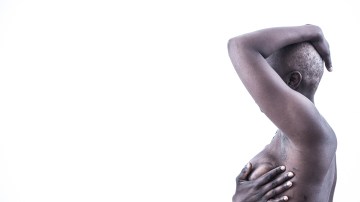Self Care Includes Healthcare: Breast Cancer Screenings Are a Necessity
Here’s what Black women should know about early detection, risk factors, and the power of proactive care

Self-care is more than just bubble baths and massages. Pleasure is important and we should prioritize it, but true self-care is holistic and includes taking your health seriously. Black people have a long, fraught relationship with the healthcare system—and rightly so. Still, that doesn’t mean we can avoid the doctor entirely.
Instead, we might have to do a little more legwork to find healthcare providers who connect with, advocate for, and truly care about their patients.
For women aged 40 to 74—and sometimes a bit younger for Black women—that healthcare includes breast cancer screenings or mammograms every year.
What is breast cancer screening?
During a mammogram, a technologist places your breast on a plastic plate. Then, another plate is lowered on top of your breast, pressing it firmly. The plates flatten and hold the breast in place while an X-ray machine takes pictures of the breast tissue from the front and side. These images will reveal any growths in the tissue, which can later be evaluated to determine if they are cancerous.
These screenings are extremely important, as breast cancer is the most common cancer diagnosis for Black women—and we are 40 percent more likely to die from breast cancer than white women, according to the Breast Cancer Research Foundation.
The reason why these screenings are so vital is because the best bet for beating breast cancer is early detection.
For those of you who have yet to have your first mammogram or have not been consistent with them, here are some things you need to know:
Know the risk.
First, assess your risk. There are numerous factors that can help estimate your breast cancer risk, including age, family history, race, and the age when you began menstruating. Talk with your healthcare provider about your specific risk factors and develop a proactive plan for your health.
Distinguish fact from fiction.
Whether you’ve had a mammogram or not, there’s a good chance that you’ve heard about the experience from a friend or family member. The number one thing I’ve heard about them is that they’re painful. This prevalent notion may actually keep some women from having the procedure, attempting to avoid the unpleasant sensation. But diagnostic radiologist Dr. Kim Wright assures women that while there may be some discomfort, it is usually brief and manageable.
While some recommendations advise that women get a mammogram every two years, Wright says it’s important to screen for breast cancer annually. Cancer can develop in a year’s time, so it’s important to check annually and consistently.
There is a prevalent notion that mammograms expose you to so much radiation that the procedure itself can be unhealthy for your body. It is true that in order to collect X-rays, you need to use radiation. But the amount of radiation used in a mammogram is low and safe for a screening once a year.
Others believe that mammograms are only necessary when you’ve discovered something abnormal in your breasts. This is also a myth. Mammograms are proactive care. They help keep a record of what your breasts look like normally so that if anything new pops up, doctors can get a head start on investigati



